Top 10 Best Online Machine Learning Courses
Machine learning (ML) is a branch of research concerned with comprehending and developing techniques that 'learn,' that is, methods that use data to improve ... read more...performance on a set of tasks. It is considered to be a component of artificial intelligence. Machine learning algorithms create a model based on training data to make predictions or judgments without having to be explicitly programmed to do so. Machine learning algorithms are utilized in a broad range of applications, including medicine, email filtering, speech recognition, and computer vision, where developing traditional algorithms to do the required tasks is difficult or impossible.In this article, This article has compiled a list of the best machine learning courses available out there.
-
This course ranks first in the top best online Machine Learning courses. This is a course where all other machine learning courses are reviewed. This beginner's course is a professor at Stanford University, a co-founder of Google Brain, a co-founder of Coursera, and a vice president who has grown Baidu's AI team to include thousands of scientists. It was taught and created by one Andrew Ng.
This course uses the open source Octave programming language instead of Python or R. This may not be a big deal for some, but if you're a complete beginner, Octave is an easy way to learn the basics of ML. Overall, the course material is very rounded and intuitively represented by Ng. The mathematics needed to understand each algorithm is fully explained, with some explanations about calculus and a review of linear algebra. This course is fairly self-contained, but any prior knowledge of linear algebra will help.
Course structure:
- Linear Regression with One Variable
- Linear Algebra Review
- Linear Regression with Multiple Variables
- Octave/Matlab Tutorial
- Logistic Regression
- Regularization
- Neural Networks: Representation
- Neural Networks: Learning
- Advice for Applying Machine Learning
- Machine Learning System Design
- Support Vector Machines
- Dimensionality Reduction
- Anomaly Detection
- Recommender Systems
- Large Scale Machine Learning
- Application Example: Photo OCR
All of this will be covered in 11 weeks. If you promise to complete the entire course, you will have a good understanding of machine learning in about four months. Then you can easily move on to more advanced or specialized topics such as deep learning, ML engineering, or other intriguing topics. This is definitely a great course to start with for beginners.
Provider: Andrew Ng, Stanford
Cost: Free to audit, $79 for CertificateRate: 4.9/5
Enroll here : https://tinyurl.com/yxytzcyy
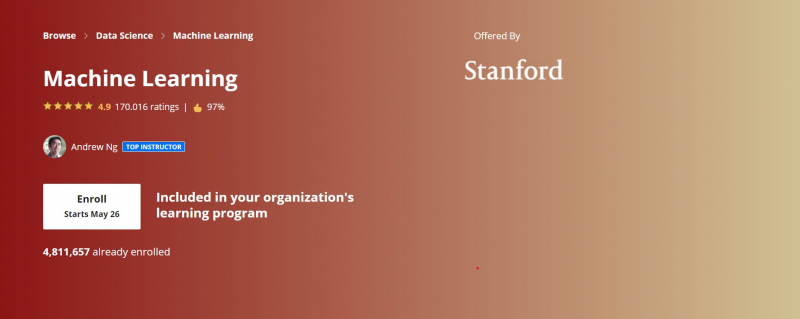
https://www.coursera.org/ 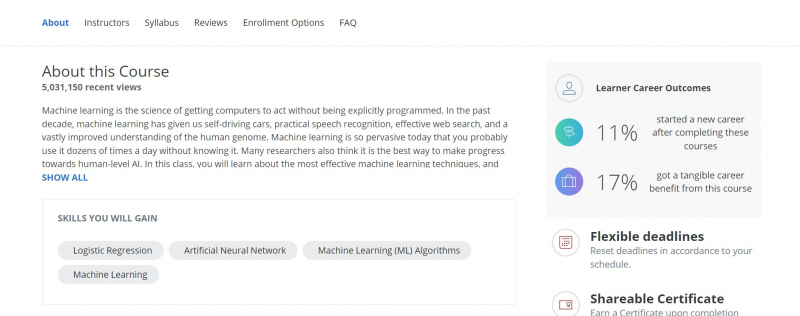
https://www.coursera.org/ -
This course ranks 2nd in the top best online Machine Learning courses. This discipline, also taught by Andrew Ng, is a more advanced set of courses for those who want to learn more about neural networks, deep learning, and how they solve many problems. Each course's assignments and lectures use the Python programming language and the TensorFlow neural network library. Of course, this is an excellent continuation of Ng's machine learning course. You'll get a similar presentation style, but it will show you how to use Python for machine learning.
Courses:
- Neural Networks and Deep Learning
- Introduction to Deep Learning
- Neural Network Basics
- Shallow Neural Networks
- Deep Neural Networks
- Improving Neural Networks: Hyperparameter Tuning, Regularization, and Optimization
- Structuring Machine Learning Projects
- Convolutional Neural Networks
- Sequence Models
To understand the algorithms presented in this course, you should be familiar with linear algebra and machine learning in general. If you need some suggestions on how to learn the math you need, check out the learning guides at the bottom of this article.
Provider: Andrew Ng, deeplearning.ai
Cost: Free to audit, $49/month for Certificate
Rate: 4.9/5
Enroll here: https://tinyurl.com/2p99a8ct
https://www.coursera.org/ 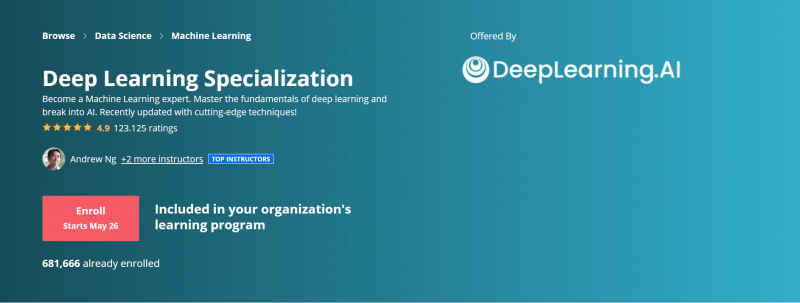
https://www.coursera.org/ -
This course ranks 3rd in the top best online Machine Learning courses. This course is offered by Google AI Education, a completely free platform that combines articles, videos, and interactive content. The Machine Learning Crash Course covers the topics needed to solve ML problems as quickly as possible. As in the previous course, Python is the programming language of choice and introduces TensorFlow. Each major section of the curriculum contains an interactive Jupyter notebook hosted by Google Colab. The video lectures and articles are concise and easy to understand, allowing you to move the course quickly and at your own pace.
Curriculum (simplified)
- Classification
- Linear and Logistic Regression
- Training and loss
- Reducing Loss - gradient descent, learning rates
- TensorFlow
- Overfitting
- Training sets, splitting, and validation
- Feature Engineering and cleaning data
- Feature Crosses
- Regularization - L1 and L2, Lambda
- Model performance metrics
- Neural Networks - single and multi-class
- Embeddings
- ML Engineering
This is the best option on this list if you're tinkering with ML but want to cover all locations. This course covers many of the machine learning nuances that can take hundreds of hours to learn randomly. At the time of writing, there seems to be no certificate of completion. Therefore, this course may not be the best choice if it is what you are looking for.
Provider: Google AI
Cost: FreeRate: 4.9/5
Enroll here:https://developers.google.com/machine-learning/crash-course/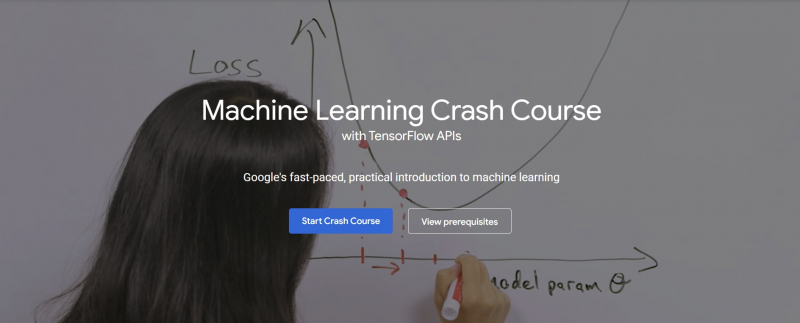
https://developers.google.com/ 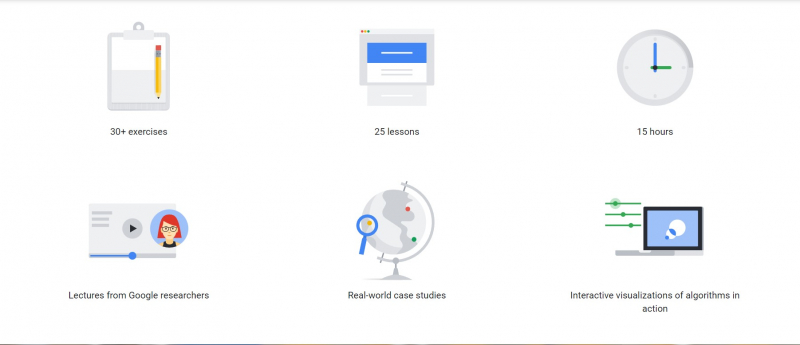
https://developers.google.com/ -
This course ranks 4th in the top best online Machine Learning courses. Another introductory course, however this one focuses entirely on machine learning's most fundamental algorithms. The teacher, slide animations, and algorithm explanations all work together to give you a good sense of the fundamentals.
This course utilizes Python and focuses on the algorithms rather than the mathematics. Each session will provide an opportunity to create an interactive Jupyter notebook in your browser to practice the new topics you've learnt. Each notebook reinforces your understanding and provides specific instructions for applying an algorithm to real-world data.
Course structure:- Intro to Machine Learning
- Regression
- Classification
- Clustering
- Recommender Systems
- Final Project
The practical guidance offered for each algorithm is one of the greatest aspects of this course. When you're first exposed to a new algorithm, the teacher explains how it works, its benefits and drawbacks, and when you should apply it. These themes are sometimes overlooked in other courses, but they are critical for new learners to grasp the larger context.
Provider: IBM, Cognitive Class
Price: Free to audit, $39/month for CertificateRate: 4.7/5
Enroll here :https://tinyurl.com/47ercue3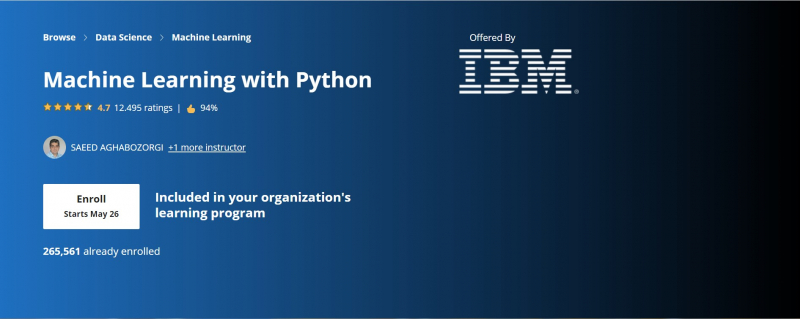
https://www.coursera.org/ 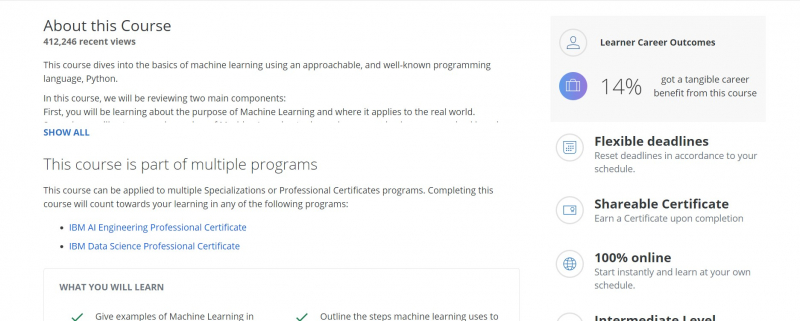
https://www.coursera.org/ -
This course ranks 5th in the top best online Machine Learning courses. This is another advanced set of courses that covers a wide range of topics. This Specialization is the key to a balanced and thorough online program if you want to explore as many machine learning techniques as feasible.
This course's instruction is excellent: it is well-presented and brief. Because of its advanced nature, it will need more math than any of the other courses mentioned thus far. If you've already completed a basic course and reviewed linear algebra and calculus, this is a wonderful way to round up your machine learning knowledge. Many machine learning tasks require much of what is presented in this Specialization.
Courses:
- Introduction to Deep LearningIntro to Optimization
- How to Win Data Science Competitions: Learn from Top Kagglers
- Bayesian Methods for Machine Learning
- Practical Reinforcement Learning
- Deep Learning in Computer Vision
- Natural Language Processing
- Addressing the Large Hadron Collider Challenges by Machine Learning
This set of courses takes roughly 8-10 months to finish, so if you start now, you'll have studied a lot about machine learning and be ready to tackle more cutting-edge applications in less than a year. Throughout the months, you'll be working on many real-world projects that will teach a computer to read, see, and play. These projects will make excellent additions to your portfolio and will make your GitHub account appear highly active to any potential employers.
Provider: National Research University Higher School of Economics
Cost: Free to audit, $49/month for Certificate
Rate: 4.7/5
Enroll here :https://tinyurl.com/mrcb7x7m
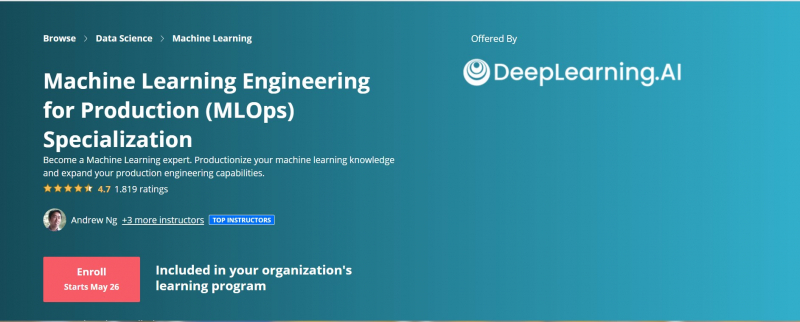
https://www.coursera.org/ 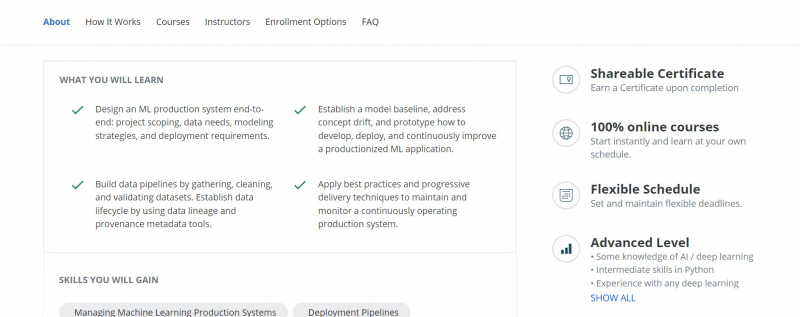
https://www.coursera.org/ - Introduction to Deep LearningIntro to Optimization
-
This course ranks 6th in the top best online Machine Learning courses. This is the most advanced course on the list, with the greatest math prerequisite. Linear algebra, calculus, probability, and programming are all skills you'll need. The course includes fascinating programming assignments in Python or Octave, although neither language is taught.
The treatment of the probabilistic approach to machine learning is one of the most notable distinctions in this course. This course would be an excellent companion to reading a textbook like Machine Learning: A Probabilistic Perspective, which is one of the most recommended data science books in Master's degrees.
Course structure:
- Maximum Likelihood Estimation, Linear Regression, Least Squares
- Ridge Regression, Bias-Variance, Bayes Rule, Maximum a Posteriori Inference
- Nearest Neighbor Classification, Bayes Classifiers, Linear Classifiers, Perceptron
- Logistic Regression, Laplace Approximation, Kernel Methods, Gaussian Processes
- Clustering, K-Means, EM Algorithm, Missing Data
- Maximum Margin, Support Vector Machines (SVM), Trees, Random Forests, Boosting
- Mixtures of Gaussians, Matrix Factorization
- Non-Negative Matrix Factorization, Latent Factor Models, PCA and Variations
- Markov Models, Hidden Markov Models
- Continuous State-space Models, Association Analysis
- Model Selection, Next Steps
Many of the concepts listed are addressed in other beginner-level courses, but the math isn't simplified here. If you've previously acquired these concepts and want to study more about the mathematics underpinning machine learning, as well as work on programming projects that derive some of the algorithms, this course is for you.
Provider: Columbia
Cost: Free to audit, $300 for Certificate
Rate:N/A
Enroll here:https://tinyurl.com/3rz7rr9p
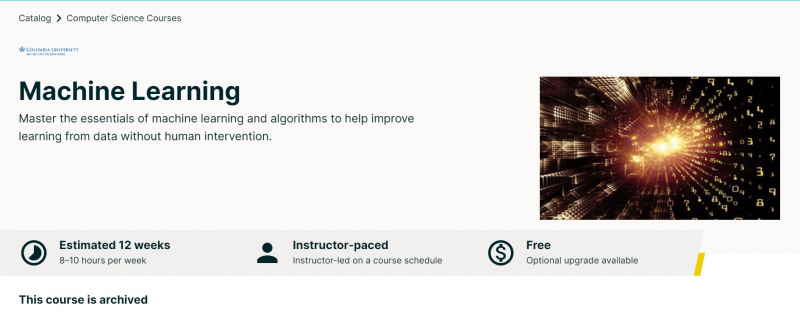
https://www.edx.org/ 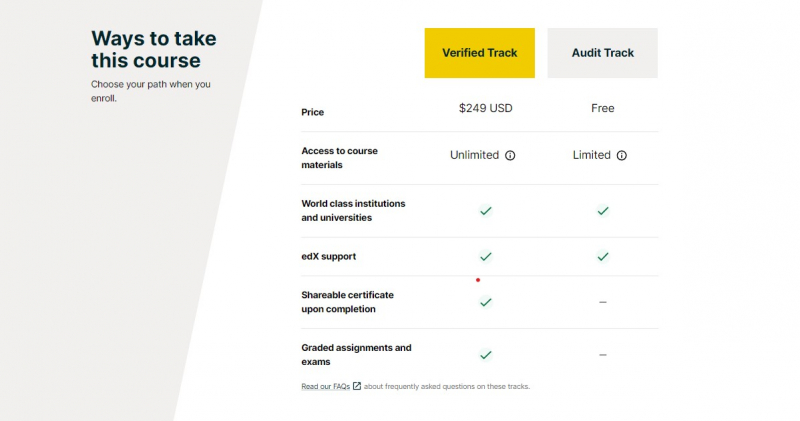
https://www.edx.org/ -
This course ranks 7th in the top best online Machine Learning courses. This fantastic, free machine learning course was created by Fast.ai for folks with around a year of Python programming expertise. The founders of Fast.ai have spent a lot of time and attention into this course — and other courses on their site. The lectures are done in a classroom with students, similar to the MIT OpenCourseware model, and the subject is based on the University of San Diego's Data Science program.
There are several videos, homework assignments, thorough notes, and a discussion board in this course. You won't find graded assignments and quizzes, nor will you receive certification upon completion, thus Coursera/Edx might be a better option if you like such elements.Because so much of the course information is applied, you'll learn a lot.
Much of the material in the course is applied, so you'll learn not just how to utilize machine learning models, but also how to deploy them on cloud platforms like AWS.
Course Structure:
- Introduction to Random Forests
- Random Forest Deep Dive
- Performance, Validation, and Model Interpretation
- Feature Importance. Tree Interpreter
- Extrapolation and RF from Scratch
- Data Products and Live Coding
- RF From Scratch and Gradient Descent
- Gradient Descent and Logistic Regression
- Regularization, Learning Rates, and NLP
- More NLP and Columnar Data
- Embeddings
- Complete Rossmann. Ethical Issues
This course is great if you are a programmer who wants to learn and use machine learning concepts, but there is one flaw: they teach machine learning using an open source library (named fastai), which is a class on other machine learning libraries like PyTorch. If you only want to use machine learning for your project and don't want to learn PyTorch, the fastai library provides useful abstractions.
Provider: Fast.ai
Cost: FreeRate: N/A
Enroll here :https://course18.fast.ai/ml
https://course18.fast.ai/ml 
https://course18.fast.ai/ml -
This course ranks 8th in the top best online Machine Learning courses. This is the first course of the IBM Machine Learning Professional Certificate, and it introduces you to Machine Learning and the professional certificate's content. This course will teach you the value of solid, high-quality data. You'll learn how to acquire data, clean it, apply feature engineering, and prepare it for preliminary analysis and hypothesis testing using popular methodologies.
You should be able to do the following by the conclusion of this course:
- Obtain data from a variety of sources: APIs, Cloud, SQL, NoSQL databases
- Describe and use standard feature engineering and feature selection strategies.
- Handle missing values, as well as categorical and ordinal attributes.
- Outliers may be detected and dealt with using a number of ways.
- Explain why feature scaling is necessary and how to apply different scaling approaches.
This course is designed for aspiring data scientists who want to learn how to use Machine Learning and Artificial Intelligence in a corporate context. To get the most out of this course, you should be comfortable programming in the Python environment and have a basic grasp of Calculus, Linear Algebra, Probability, and Statistics.
Syllabus:
- WEEK1 (2 hours to complete): A Brief History of Modern AI and its Applications
- WEEK 2 (3 hours to complete): Retrieving and Cleaning Data
- WEEK 3 (5 hours to complete): Exploratory Data Analysis and Feature Engineering
- WEEK 4 (3 hours to complete) :Inferential Statistics and Hypothesis Testing
- WEEK 5 (1 hour to complete): (Optional) HONORS Project
Provider: Coursera
Cost: Premium
Rate: 4.6/5
Enroll here: https://tinyurl.com/yet7chmv
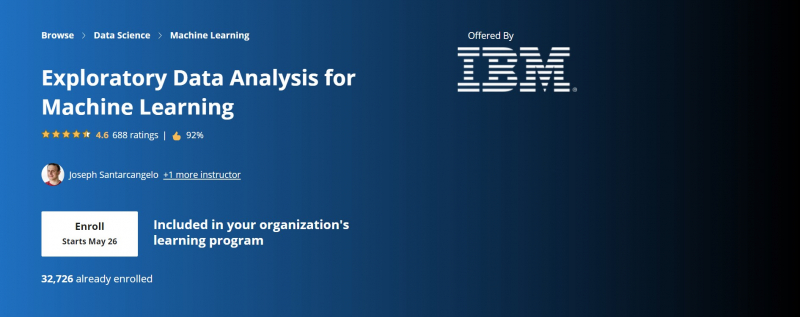
https://www.coursera.org/ 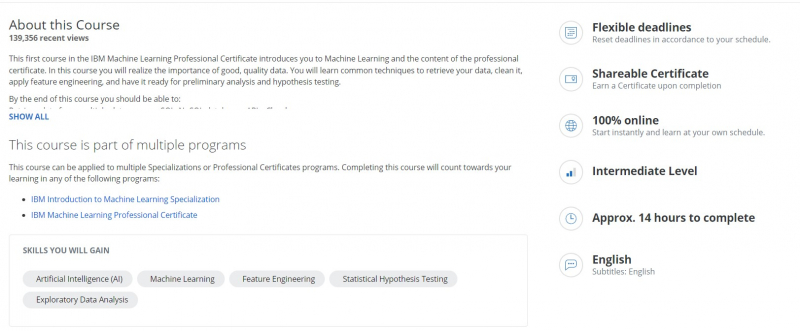
https://www.coursera.org/ -
This course ranks 9th in the top best online Machine Learning courses. This course exposes you to one of the most used supervised Machine Learning modeling families: regression. You'll learn how to utilize error metrics to compare models and how to train regression models to predict continuous outcomes. Best practices, such as train and test splits, and regularization strategies, are also covered in this course.
You should be able to do the following by the conclusion of this course:
- In the domain of supervised machine learning, distinguish between the uses and applications of classification and regression.
- Explain and use linear regression models.
- Compare and choose a linear regression model that best fits your data using a number of error measures.
- Explain why regularization may aid in the prevention of overfitting.
- Regressions using regularization: Elastic net, LASSO, and Ridge
Explain why regularization may aid in the prevention of overfitting. Regularization regressions like as Ridge, LASSO, and Elastic net can be used. This course is designed for aspiring data scientists who want to learn how to use Supervised Machine Learning Regression methods in a commercial scenario. You should be familiar with Python programming and have a basic grasp of Data Cleaning, Exploratory Data Analysis, Calculus, Linear Algebra, Probability, and Statistics in order to get the most out of this course.
Syllabus:
- WEEK1 (2 hours to complete): Introduction to Supervised Machine Learning and Linear Regression
- WEEK 2 (4 hours to complete): Data Splits and Cross Validation
- WEEK 3 (5 hours to complete): Regression with Regularization Techniques: Ridge, LASSO, and Elastic Net
Provider: Coursera
Cost: PremiumRate: 4.7/5
Enroll here: https://tinyurl.com/9k8fzzbv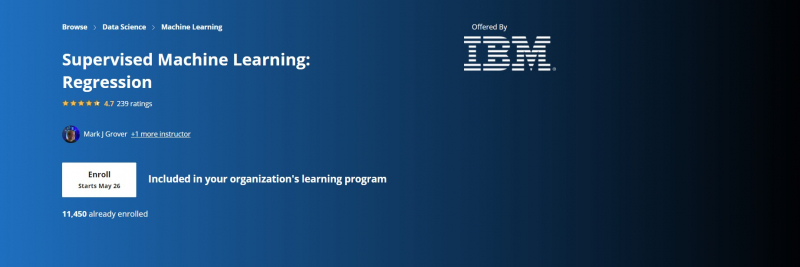
https://www.coursera.org/ 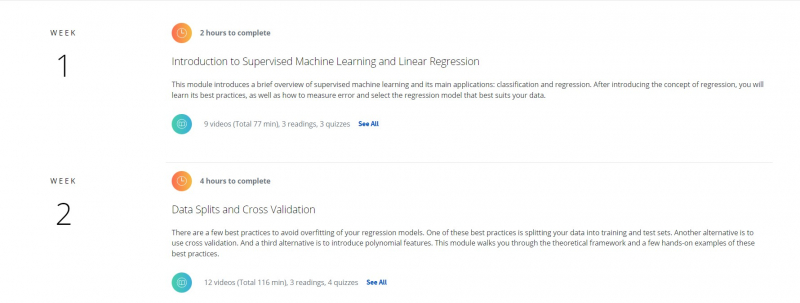
https://www.coursera.org/ -
This course ranks f10th in the top best online Machine Learning courses. This course will introduce you to unsupervised learning, which is one of the most common forms of machine learning. You'll discover how to extract information from data sets that lack a target or labeled variable. You'll learn how to choose the optimal method for your data from a variety of clustering and dimension reduction strategies for unsupervised learning. This course's hands-on component focuses on how to employ best practices for unsupervised learning.
- Explain the types of issues that are suited for Unsupervised Learning techniques before the conclusion of this course.
- Explain how the curse of dimensionality makes clustering with numerous characteristics difficult.
- Explain and implement standard clustering and dimensionality reduction techniques.
- When appropriate, try grouping points and comparing the performance of per-cluster models.
- Recognize key metrics for cluster classification.
This course is designed for aspiring data scientists who want to learn how to use Unsupervised Machine Learning techniques in a corporate context. You should be familiar with Python programming and have a basic grasp of Data Cleaning, Exploratory Data Analysis, Calculus, Linear Algebra, Probability, and Statistics in order to get the most out of this course.
Syllabus:
- WEEK1 (3 hours to complete): Introduction to Unsupervised Learning and K Means
- WEEK 2 (5 hours to complete): Selecting a clustering algorithm
- WEEK 3 (5 hours to complete): Dimensionality Reduction
Provider: Coursera
Cost: Premium
Rate:4.7/5
Enroll here: https://tinyurl.com/52rra8wz

https://www.coursera.org/ 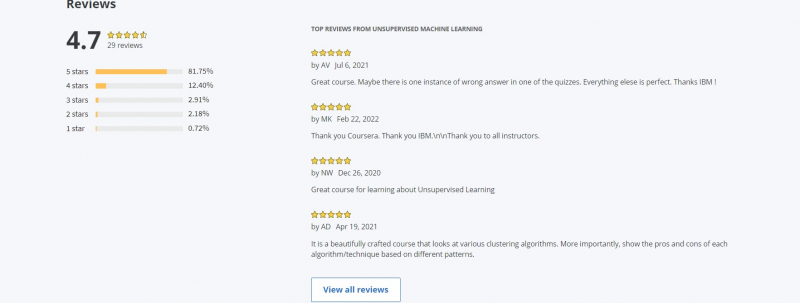
https://www.coursera.org/































